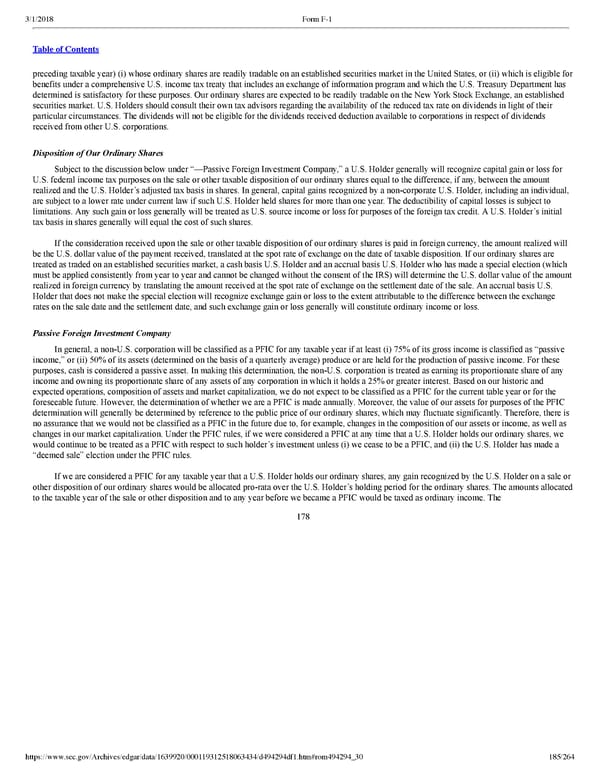185/264 preceding taxable year) (i) whose ordinary shares are readily tradable on an established securities market in the United States, or (ii) which is eligible for benefits under a comprehensive U.S. income tax treaty that includes an exchange of information program and which the U.S. Treasury Department has determined is satisfactory for these purposes. Our ordinary shares are expected to be readily tradable on the New York Stock Exchange, an established securities market. U.S. Holders should consult their own tax advisors regarding the availability of the reduced tax rate on dividends in light of their particular circumstances. The dividends will not be eligible for the dividends received deduction available to corporations in respect of dividends received from other U.S. corporations. Disposition of Our Ordinary Shares Subject to the discussion below under “—Passive Foreign Investment Company,” a U.S. Holder generally will recognize capital gain or loss for U.S. federal income tax purposes on the sale or other taxable disposition of our ordinary shares equal to the difference, if any, between the amount realized and the U.S. Holder’s adjusted tax basis in shares. In general, capital gains recognized by a noncorporate U.S. Holder, including an individual, are subject to a lower rate under current law if such U.S. Holder held shares for more than one year. The deductibility of capital losses is subject to limitations. Any such gain or loss generally will be treated as U.S. source income or loss for purposes of the foreign tax credit. A U.S. Holder’s initial tax basis in shares generally will equal the cost of such shares. If the consideration received upon the sale or other taxable disposition of our ordinary shares is paid in foreign currency, the amount realized will be the U.S. dollar value of the payment received, translated at the spot rate of exchange on the date of taxable disposition. If our ordinary shares are treated as traded on an established securities market, a cash basis U.S. Holder and an accrual basis U.S. Holder who has made a special election (which must be applied consistently from year to year and cannot be changed without the consent of the IRS) will determine the U.S. dollar value of the amount realized in foreign currency by translating the amount received at the spot rate of exchange on the settlement date of the sale. An accrual basis U.S. Holder that does not make the special election will recognize exchange gain or loss to the extent attributable to the difference between the exchange rates on the sale date and the settlement date, and such exchange gain or loss generally will constitute ordinary income or loss. Passive Foreign Investment Company In general, a nonU.S. corporation will be classified as a PFIC for any taxable year if at least (i) 75% of its gross income is classified as “passive income,” or (ii) 50% of its assets (determined on the basis of a quarterly average) produce or are held for the production of passive income. For these purposes, cash is considered a passive asset. In making this determination, the nonU.S. corporation is treated as earning its proportionate share of any income and owning its proportionate share of any assets of any corporation in which it holds a 25% or greater interest. Based on our historic and expected operations, composition of assets and market capitalization, we do not expect to be classified as a PFIC for the current table year or for the foreseeable future. However, the determination of whether we are a PFIC is made annually. Moreover, the value of our assets for purposes of the PFIC determination will generally be determined by reference to the public price of our ordinary shares, which may fluctuate significantly. Therefore, there is no assurance that we would not be classified as a PFIC in the future due to, for example, changes in the composition of our assets or income, as well as changes in our market capitalization. Under the PFIC rules, if we were considered a PFIC at any time that a U.S. Holder holds our ordinary shares, we would continue to be treated as a PFIC with respect to such holder’s investment unless (i) we cease to be a PFIC, and (ii) the U.S. Holder has made a “deemed sale” election under the PFIC rules. If we are considered a PFIC for any taxable year that a U.S. Holder holds our ordinary shares, any gain recognized by the U.S. Holder on a sale or other disposition of our ordinary shares would be allocated prorata over the U.S. Holder’s holding period for the ordinary shares. The amounts allocated to the taxable year of the sale or other disposition and to any year before we became a PFIC would be taxed as ordinary income. The 178
 Spotify F1 | Interactive Prospectus Page 184 Page 186
Spotify F1 | Interactive Prospectus Page 184 Page 186